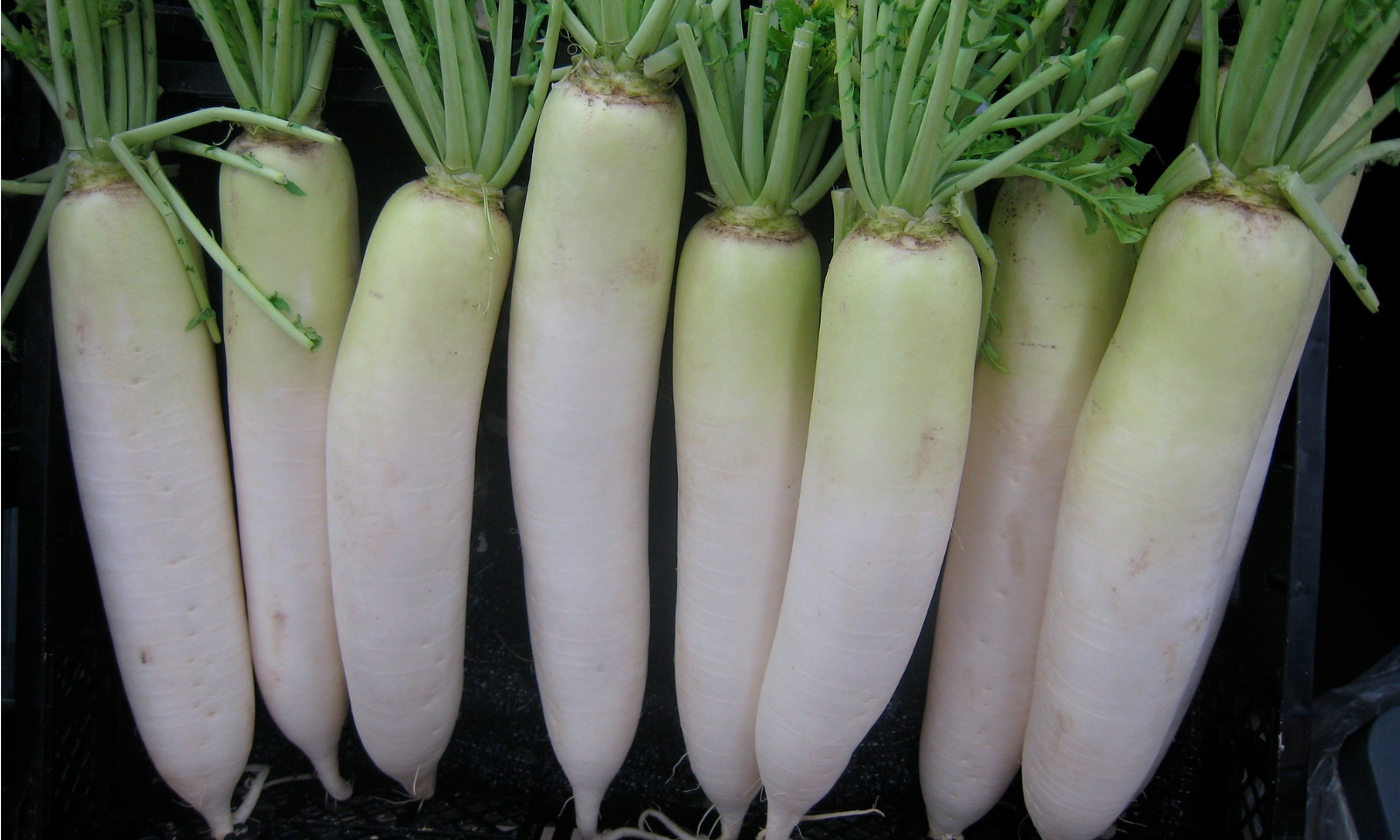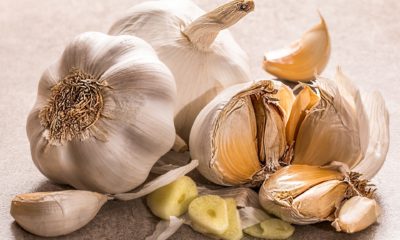SUPERFOOD
15 Research-backed Health Benefits of Radish!
Radish is an edible root vegetable. It was domesticated in Europe in pre-Roman times. They are grown and consumed throughout the world. It is mostly eaten raw as a crunchy salad vegetable.
There are numerous varieties of radishes having different flavors, colors, sizes. Radishes have a sharp flavor due to various chemical compounds produced by plants like myrosinase, glucosinolate, and isothiocyanate.
The oil obtained from the seeds of radish is used in many products and also beneficial for health applications. Radish, primarily in Asian markets, is also known by the name Daikon.
Radishes are low in calories. They are a very good source of antioxidants, vitamins, electrolytes, minerals, and dietary fiber. They also contain adequate levels of vitamin B-6, folates, riboflavin, thiamin, iron, magnesium, and calcium.
Radish also contains many phytochemicals such as indoles which are detoxifying agents, lutein, zeaxanthin, and beta-carotene, which are flavonoid antioxidants.
Radish helps to get relief from urinary disorders, piles, stomach illness, cancer, cardio problems, respiratory diseases, skin problems. Moreover, it works on overall health keeping you healthy.
Nutritional Value
Nutritional Value per 100 g
| Energy | 66KJ |
| Carbohydrates | 3.4g |
| Sugars | 1.86g |
| Dietary fibers | 1.6g |
| Protein | 0.68g |
| Riboflavin | 0.039mg |
| Niacin | 0.254mg |
| Pantothenic acid | 0.165mg |
| Vitamin B6 | 0.071mg |
| Folate | 25 μg |
| Vitamin C | 14.8mg |
| Calcium | 25mg |
| Iron | 0.34mg |
| Magnesium | 10mg |
| Manganese | 0.069mg |
| Phosphorus | 20mg |
| Potassium | 233mg |
| Zinc | 0.28mg |
| Fluoride | 6 μg |
Health Benefits of Radish
1. A natural cure for Jaundice
Radishes are a powerful detoxifier. They are very good for the liver and stomach. They help to purify the blood, eliminating toxins and waste. Radishes are extremely helpful during jaundice because it removes bilirubin and also keeps its production at a stable level. It also reduces the destruction of red blood cells, increasing the supply of fresh oxygen to the blood. Black radishes are preferred in the treatment of jaundice.
2. Relief from Piles (Haemorrhoids)
Radishes are considered as roughage. This helps to facilitate digestion, fix constipation, and water retention, which is one of the major causes of piles. Being an excellent detoxifier, it helps heal the symptoms of piles quickly. Its juice also soothes the digestive and excretory system.
3. Prevents Urinary Disorders
Radishes act as a diuretic, which means that they increase the production of urine. They also cure inflammation and a burning feeling during urination. Its detoxifying properties also help to clean the kidneys and inhibit infections in the urinary system.
4. Aids in Weight Loss
Radishes keep the stomach full for a long time. They are high in roughage, low in digestible carbohydrates, and contain a lot of water. Moreover, they are low on the glycemic index and high in fiber, which means that they increase regular bowel movements, which helps in weight loss. Learn How to Lose weight with diet in just 7 days!
5. AntiCancer
Radishes are known to be good detoxifiers and also rich in vitamin-C and anthocyanin, help in treating many types of cancer, particularly colon, stomach, kidney, oral and intestinal cancer. They are packed with antioxidants. Moreover, the isothiocyanate in radishes alters the pathways so much, that they can cause cell death, thereby eliminating cancerous cells from reproducing.
6. Cures Leucoderma
Radish seeds are of great use in curing Leucoderma. You only need to soak the powder of seeds in ginger juice vinegar or cow’s urine and then apply on the white patches. You can also eat radishes as well to aid the treatment of Leucoderma.
7. Cures Constipation
The high fiber content of radish adds considerable bulk to bowel movements that promote regular excretory patterns and relieve symptoms of constipation. They help to get rid of loose stool or diarrhea. Moreover, radishes promote the production of bile which is the most important part of good digestion and also helps to protect both the liver and the gallbladder.
8. Respiratory Disorders, Bronchitis and Asthma
Radishes help to decrease congestion of the respiratory system that can come from colds, infections, and allergies. They are a great disinfectant which further protects the respiratory system from infections.
9. Blood Pressure
Radishes are a good source of potassium, which has been positively connected to reducing blood pressure. Potassium reduces the blood pressure by widening the flow of the blood, relaxes the blood vessels, and therefore increase blood flow.
10. Managing Diabetes
Radishes have a low glycemic index. This means that eating radish won’t impact your blood sugar levels. Furthermore, it also helps to regulate the absorption of sugars into the bloodstream. Check out 21 ways to lower your blood sugar levels!
11. Treating skin disorders
Vitamin-C, zinc, phosphorus, vitamin-B complex present in radishes are good for the skin. The water in radishes helps to maintain healthy moisture levels in the skin. The disinfectant properties of radishes help clear up skin disorders like rashes, dry skin, and cracks.
12. Give relief from Fever
Radishes help lower body temperature and also relieve inflammation from fevers. They are good disinfectants, also fight infections that can cause fever.
13. Give relief in Kidney Disorders
As a diuretic, radishes help in the treatment of many kidney disorders. It helps wash away the toxins accumulated in the kidneys and they decrease the accumulation of toxins in the blood. It also keeps away from infections.
14. Insect Bites
Radishes can be used as an effective treatment for insect bites and bee stings because of their antipruritic properties. The juice also reduces pain and swelling and help soothe the affected area.
15. Prevents Dehydration
Radishes are a great way to keep the body hydrated because they are mostly composed of water. Staying hydrated relieves constipation, improves the efficiency of digestion, and ensures proper uptake of nutrients from the food we eat.
Tips to add radish to your diet
- You can just slice the radish into many pieces and sprinkle some salt and lemon on it, eat as a salad. You can add other vegetables also or eat them alone.
- You can also try crunchy radishes with mild ricotta as dipping. It makes a great snack.
- You can also try this vegetarian sandwich. Add crunchy snow peas, radishes with creamy cheese and mashed avocado between your bread and enjoy.
- You can also try pickles. Make them the same way you do like your mango pickle. Enjoy the spicy taste.
Precautions
- In cases of pregnancy and breastfeeding, stay on the safe side, and avoid radish. It is not much known about what effect does radish have during these conditions.
- Avoid radish if you have Gallstones.
- If you are going for surgery, avoid radish before and after surgical operations, at least 2 weeks or better to avoid eating eat.



















